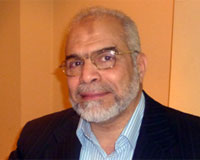Egypt: Does God permit a Muslim to break a promise?
by - 11th April 2012
 The Muslim Brotherhood set Egyptian politics ablaze this week with their decision to nominate their chief financier, Khairat al-Shater, for the presidency.
The Muslim Brotherhood set Egyptian politics ablaze this week with their decision to nominate their chief financier, Khairat al-Shater, for the presidency.
All political groups recognize the right of the group to do so but many have criticized them harshly, recalling their promise from early in the revolution.
The Brotherhood assured both revolutionary forces and Western observers they had no ambitions for the presidency, anxious to calm fears of an Islamist takeover. They even expelled a prominent member, Abdel Munim Abul Futuh, who declared his candidacy early on.
In an interview with Lapido Media, MB Spokesman Mahmoud Ghozlan explained the promise was necessitated by fear the West would extinguish the revolutionary movement.
Now the reversal was necessary to protect the revolution from former regime members seeking the presidency.
Perhaps this political analysis is reasonable, but the Brotherhood are not simply politicians; they are also Muslims. An anxious West expects men of religion to keep their promises.
Pressed on this question, Ghozlan was quick to answer. ‘If you want religious justification, the Prophet said: “If someone swears by his right hand, saying, ‘By God I will do this or that…’, but then sees something better than it, he may atone for his right hand, and do that which is better.”
‘There is a difference between matters of principle and political decisions. Politics is firstly concerned with the general benefit.’
Yet as the Brotherhood defines this benefit to coincide with their own advantage, they risk confirming fears the group cannot be trusted, which some in the West extend to Muslims in general.
Lapido Media inquired of scholars of three different Islamic trends to test Ghozlan’s interpretation. All three confirm the message of the tradition, though they differ in application.
 Mohamed Omar Abdel Rahman is a veteran jihadist who fought in Afghanistan. He is also the son of Omar Abdel Rahman, better known as the Blind Sheikh, currently serving a life sentence in the United States for plotting the 1993 bombing of the World Trade Center.
Mohamed Omar Abdel Rahman is a veteran jihadist who fought in Afghanistan. He is also the son of Omar Abdel Rahman, better known as the Blind Sheikh, currently serving a life sentence in the United States for plotting the 1993 bombing of the World Trade Center.
He contrasts two examples. ‘There is a difference between a pact and a promise. A pact is an agreement between two parties and cannot be changed without common agreement, as in the Camp David Accords between Egypt and Israel.
‘This tradition of Muhammad refers to a promise and applies only to one’s self. So this can be changed if something better emerges or if circumstances change, which the Brotherhood clearly believes has happened.’
 Osama al-Qusi is a Salafi scholar, trained under Wahhabi thought in Saudi Arabia and Yemen. He is controversial in Egypt, however, for his oft-criticized liberal interpretations.
Osama al-Qusi is a Salafi scholar, trained under Wahhabi thought in Saudi Arabia and Yemen. He is controversial in Egypt, however, for his oft-criticized liberal interpretations.
He believes Ghozlan is misusing Muhammad’s words. ‘There is a big difference in what I say between me and God, which is the meaning of this tradition, and what I say to other people.
‘This is a religious mistake, no matter how politically justifiable it might be.’
Abdel Muti al-Bayyoumi is a member of the Islamic Research Academy and a traditional Azhar scholar. He and his institution represent mainstream Muslim thought throughout the Sunni world.
Like Abdel Rahman, he clarifies as to the nature of the Brotherhood’s commitment. ‘This tradition does not apply because they did not swear to God but only made a promise.
‘In terms of a promise the right to change it depends on their intention; if it was good it is acceptable.
‘The matter is between them and God, but they have to offer their justification, which if good should be accepted.’
Yet Bayyoumi, like many in Egypt, find neither their intention nor their justification acceptable.
‘It appears to me they want to consolidate power. They are aiming for the presidency, the parliament, the constitution, and who knows what else.’
While a man’s word should be his bond, most admit honest circumstances can free one from a pledge. For many in the West, though, religion in politics risks staining the former and manipulating the latter.
The Muslim Brotherhood, however, believes Islam and politics to be compatible, even inseparable.
How they navigate the quagmire will affect not only their own political fortunes, but also the greater Western perception of Islam.
- Log in to post comments
